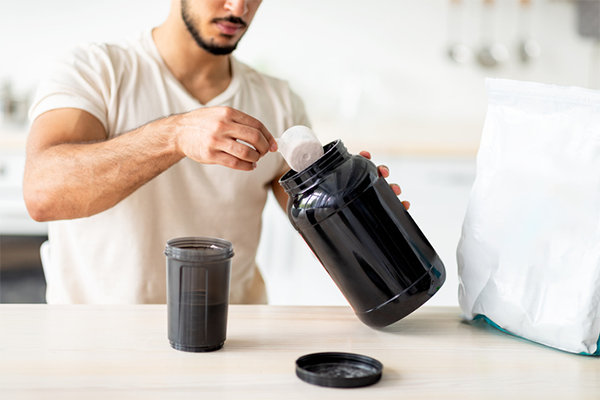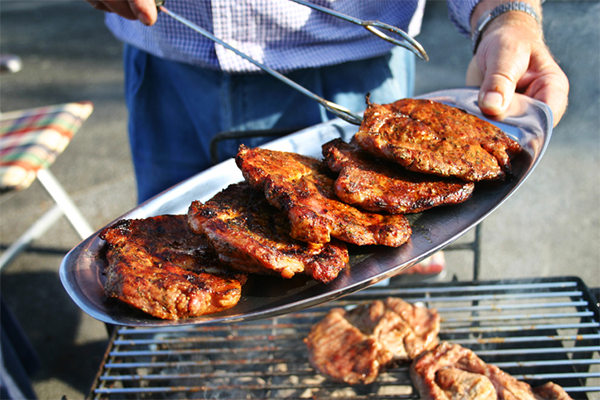
Get Ripped Without Ripping One — How to Prevent Protein Farts
By Michael Martin
There's an uncomfortable truth about supplementing with protein: It can leave you feeling bloated and gassy — and conspicuous. Protein farts can happen to anyone. Even actor James McAvoy battled the phenomenon while filming scenes with Angelina Jolie on the set of Wanted.
It may be as embarrassing to say or Google “protein farts" as it is to experience them. But we'll face this menace together. Here's what the experts say about why protein causes gas and flatulence in some people and what can be done to prevent it.
Get over 20 grams of high-quality protein with no artificial sweeteners or flavors in LADDER Whey or Plant Protein.
.
What causes protein farts?
Protein farts can usually be traced back to these two ingredients commonly found in protein powder supplements.
1. Sweeteners
"Certain protein supplements are definitely known to result in gas and bloating," says Allison Sizemore, a certified sports nutritionist in Kansas City, Missouri. "The issues are not usually with the protein itself, but other items protein supplements may contain." She explains that many protein powders and bars can contain sugar substitutes and/or sugar alcohols (xylitol and mannitol) that commonly cause gas.
2. Lactose
"Popular protein supplements like whey protein (concentrate) powder can cause bloating because of the lactose content," says Steve Theunissen, RDN, a registered dietitian nutritionist and ISSA/IFPA certified personal trainer. "Whey protein is essentially powdered milk with most of the fat and carbohydrates taken away. So if you're intolerant to dairy products and suffer from bloating or gas after drinking milk, chances are that you'll have the same reaction to some protein supplements."
.
How do you stop protein farts?

Here are some reliable ways to prevent unwanted flatulence from protein.
1. Try an unsweetened protein powder
Because sweeteners like xylitol or mannitol can cause digestive upset, you could start your pursuit of being fart-free by trying a protein powder that lacks those specific types of sweeteners.
2. Try whey isolate
Whey protein isolate contains more protein — and fewer other potentially troublesome components — than whey protein concentrate, so you may want to give it a try. "Whey isolate may be a much better option given that it is far lower in lactose," says certified personal trainer Joe Johnson. "Even for people without lactose intolerance, this type of protein is generally much easier to digest."
3. Try a plant-based protein powder
If you know that lactose or whey bothers you, going plant-based could be the solution. "Pea protein powder is a great alternative to whey protein powder," says Reda Elmardi, RD, CSCS, a registered dietitian and certified strength and conditioning specialist. It's made from yellow peas that contain all nine essential amino acids. Since most protein powders are pure protein, they contain very few carbs.
Unfortunately, plant-based powders aren't the answer for everyone. "Many plant-based (whole-food) protein sources, such as legumes and beans, are known to cause gas and bloating as well," says Sizemore. "This can happen with anyone, not just those with food sensitivities."
4. Stick with whole-food sources of protein
If you've tried a few different protein supplements and are still experiencing discomfort, you can still boost your protein intake and realize muscle-building benefits. "If you are experiencing effects from consuming protein supplements, stick with whole food sources, such as animal proteins, to avoid the gas and bloating that may come along with things like protein bars and powders," says Sizemore.
.
Are there health risks from taking too much protein?

As with everything, there are potential health risks from taking too much protein. But it's pretty difficult to eat so much protein that it negatively impacts your health. You're more likely to have a side effect caused by one of the reasons above, which you can remedy by trying a different protein source.
A more common scenario: Protein contains calories, and if you're consuming much more than your body can process, those excess calories might be converted to fat.
- Whether you want to lose weight, gain muscle, or maintain, a good macro ratio to aim for is around 40% carbs, 30% protein, and 30% fat.
- The minimum recommended daily protein intake for the average person is 0.8 grams per kilogram of body weight. For those who are exercising and are more active or are of advanced age, the protein recommendation is upwards of 1.2-1.6g/kg body weight per day (refer to the next bullet point). That's about 46 grams of protein a day for women age 19 and older and 56 grams for men age 19 and older.
- If you're an athlete or exercise regularly, the Academy of Nutrition and Dietetics and the American College of Sports Medicine recommend 1.2 to 2.0 grams of protein per kilogram of body weight per day, depending on your training regimen.



